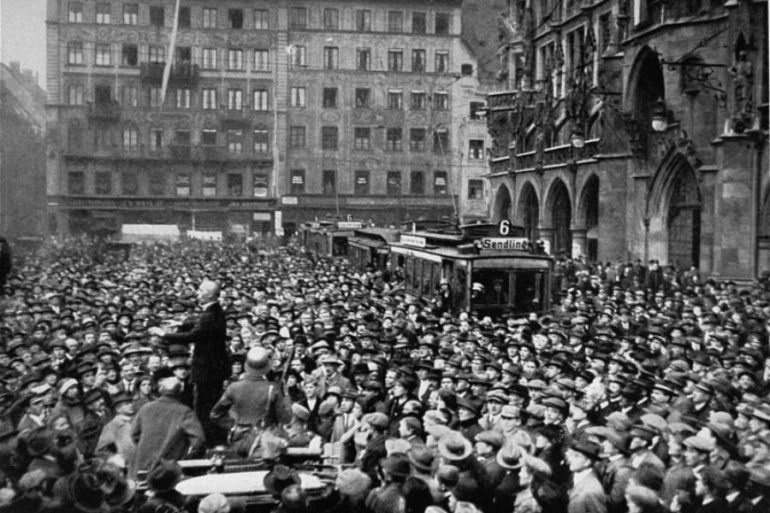It was November 8, 1923. Former Sergeant Adolf Hitler and his associates plotted to seize power in a coup. Their attempt failed miserably and was dubbed the "Brewery Coup". However, it was what made him famous throughout Germany and gave him the support to seize power 9 years later.
After the defeat in World War I, the political situation in Germany was at least fragile. The so-called "Weimar Republic" was vulnerable to anyone telling the world that certain people were to blame for the defeat. One of them was Adolf Hitler, then founder of the rising National Socialist Party, which already had 35 members. Unemployment and the economic crisis plagued society and the people needed to be caught from anywhere.
Hitler was giving speeches in Munich pubs, which had begun to fill to the brim, simply telling people what he wanted to hear. At the end of September 1923 he announced a series of demonstrations, in which the far-right organizations of Bavaria would also take part.
His announcement alarmed the state's conservative prime minister, Eugen Ritter von Nilling, who declared it a state of emergency. He even set up a three-member committee of local officials consisting of Gustav von Karr, Police Colonel Hans von Zaiser and General Otto von Losoff.
In the back of the mind of Hitler and his collaborators was the seizure of power and to march later to Berlin, as Mussolini had done with "The Road to Rome" just a year earlier. They were given the opportunity on the night of November 8th. Gustav von Karr would speak in front of 3.000 prominent Bavarian citizens at the Birgerbroekler brewery. Hitler and 600 members of their party appeared at 8.30pm.
He entered the brewery and shot on the roof. Shortly afterwards, he shouted, "The national revolution is in progress. The governments of Bavaria and Berlin collapsed. "In a short time we will form our own government." The invaders held Bavarian politicians hostage, and Hitler locked von Karr and two others in a room, threatening to execute them if they did not unite with his own.
All three accepted. They returned to the hall and announced to the hostages - attendees that they would follow Hitler, with their speech in his favor being very warm. Hitler left the brewery to oversee the continuation of his plan, and around 10.30pm, World War I hero General Ludendorff released von Karr and his associates, even though he had joined Hitler.
Authorities learned what happened at the brewery. Munich police and army forces remained loyal to Deputy Prime Minister Franz Matt and took over the crackdown. Of course, their leaders had already sided with Hitler. The coup attempted to seize government buildings in the city. At 3 a.m. on November 9, the first two victims of the violent coup were reported by insurgents. By morning, the plate had begun to tilt in favor of the government. Hitler was desperate.
Ludendorff had the idea to occupy the Ministry of Defense. Hitler drove about 2 men there but met with serious resistance, resulting in the deaths of 14 coup plotters and 4 soldiers. Hitler was injured and tried to escape. The "Brewery Coup" had failed.
He had made the mistake of not occupying the radio station and the Telegraph Service, so Berlin was aware of the situation and gave the appropriate instructions to suppress the coup. On November 11, 1923, Hitler was arrested on charges of high treason. The trial began on February 26, 1924. Hitler was acquitted and sentenced to five years in prison. He served only 5 months of his sentence. During this time he managed to write the book "O Agon Mou", which was also the manifesto of his party. The months he spent in prison were like living in a palace, with many of the guards becoming loyal followers of his ideology and serving him.
The "Brewery Coup" changed Hitler's view of a violent seizure of power. He succeeded in 1932 when he was proclaimed chancellor, but only a year later he staged a coup in Parliament demanding all powers for his government, with Germany officially entering the years of his dictatorship.
